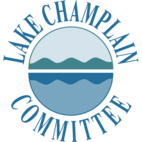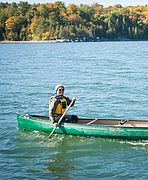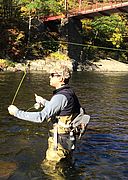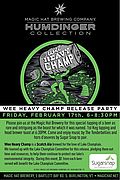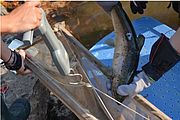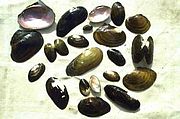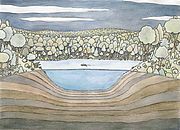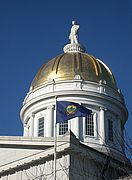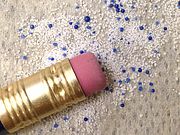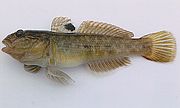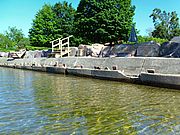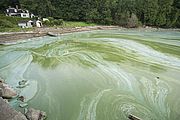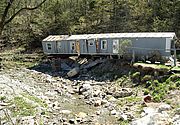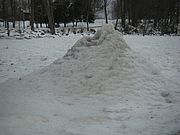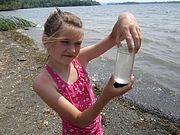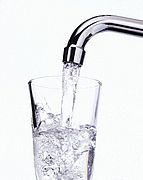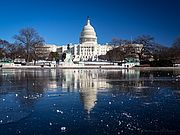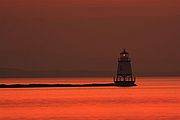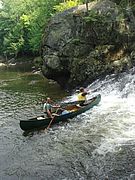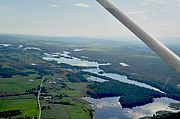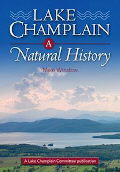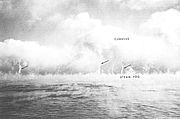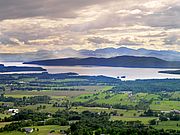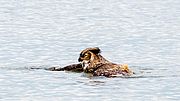LCC is delighted to have ECO AmeriCorps member, Dominic Brennan, serving with us for a healthy, accessible lake!
Read...News from Selected Category
LCC is delighted to have Water Protection Advocate, Jared Carpenter, working with us for a healthy, accessible lake!
Read...Join us at Magic Hat Brewery on February 17 for a special tapping of Wee Heavy Champ -- a beer brewed for Lake Champlain!
Read...Follow an Atlantic salmon on its journey upstream to spawn in a tributary of Lake Champlain driven by its instincts (and a pickup truck).
Read...Every month, the Vermont's Clean Water Initiative Program highlights a "Clean Water Superstar", species that help keep waters swimmable, drinkable, and fishable. This month the spotlight is on mussels, the hardworking mollusks that filter algae, bacteria, and dead organic material out of the water.
Read...Walden Pond is a 62-acre kettle pond in sand and gravel that formed around a block of melting glacial ice about 15,000 years ago. It was here that Thoreau produced one of the first maps of an American lake bed by lowering a weighted line through winter ice.
Read...March 16-22 - Fix a Leak Week
More than one trillion gallons of water are lost annually in the U.S. due to easy-to-fix household leaks. Fix them during Fix a Leak Week!
LCC, the US Environmental Protection Agency and other WaterSense partners are promoting a week focused on water conservation. Wasting water wastes energy and money and can contribute <link lcc-at-work water-conservation _blank internal link in current>to lake pollution. Get a jump on the week by reviewing your water bills and seeing how much water you consume, then visit <link lcc-at-work water-conservation _blank internal link in current>LCC's Water Conservation page for <link lcc-at-work water-conservation water-conservation-tips-for-the-home _blank external link in new>additional water saving tips.
If your faucet drips or your toilet runs it can waste over 10,000 gallons a year -- the amount of water in a typical backyard swimming pool. Finding and fixing leaks around the home can be as simple as check, twist and replace.
· Check toilets - put a few drops of food coloring into the tank; wait a few minutes and see if the color appears in the bowl before you flush. If it does, there's a leak.
· Twist on aerators - add new WaterSense labeled faucet aerators and showerheads and tighten pipe and hose connections to save water.
· Replace leaking fixtures - be sure to choose WaterSense labeled fixtures when building or rennovating. They are independently certified to use 20 percent less water and perform as well or better than standard models.

March 17 - Clean Water Day
Come learn about water quality legislation pending in the Vermont Legislature and show your support for clean water at the Vermont state capitol in Montpelier. This program runs from 9:30 AM to noon in Room 11 of the Vermont State House. Hear about water quality priorities from Speaker of the House Shap Smith, get briefings on important bills moving through the Legislature, and connect with other citizens who care about clean waterways. Let legislators know you want to see action to protect water by coming to "the people's house" on St. Patrick's Day. Clean Water Day is sponsored by LCC, Vermont Conservation Voters, Vermont Natural Resources Council, Sierra Club Vermont, Toxics Action Center, and Watersheds United Vermont. To RSVP, email lcc@lakechamplaincommittee.org. Read...
Read more about Lake Champlain's threatened and endangered bird species, fishing regulation changes, replica boats, invasive species in the Adirondacks, erosion and more. Read...
Water quality improvements for Lake Champlain were a central theme when Vermont Governor Peter Shumlin stepped to the podium to deliver his inaugural address on January 8th. The Governor called for increased accountability for farm pollution and the establishment of a clean water fund that would provide increased funding for water quality projects. Read...
Earlier this week the Vermont House unanimously approved H.4, a bill to ban the manufacture and sale of harmful plastic microbeads from personal care products and over the counter drugs. These plastic beads are problematic because they wash down drains, slip through wastewater treatment plants and end up in our waterways. Read...
The spiny waterflea arrived in Lake Champlain last summer, becoming the 50th invasive species in the lake. We know it won’t be the last. Recently, a group of environmental professionals discussed what species posed the greatest risk of being the next arrival. Three likely candidates were round goby, hydrilla, and VHS. Read...
Since 2011 the region has made considerable investments in preparing for future floods. We all want to be more resilient when disasters like Tropical Storm Irene or the lake flooding of 2011 come about. Read...
Last August a blue-green algae bloom over the water treatment intake for Toledo, Ohio caused the city to test for the presence of microcystin, a toxin produced by some blue-green algae species. They found more than 1 part per billion of microcystin in the finished water, with concentrations peaking at about 2.5 parts per billion over the next two days. Read...
The flooding from Tropical Storm Irene made tangible the community costs that can occur when landowners develop floodplains. Homes and structures built too close to the water washed away becoming dangerous projectiles and in some cases damaging bridges or downstream properties. Read...
While skating along the flat clear ice of Mallets Bay four or five years ago, Jamie Leopold noticed a geyser of water shooting straight up into the air – 30 to 50 feet high. He may have witnessed a particularly large ice volcano. Read...
On January 21 a truck went through the ice on the banks of Fort Ticonderoga. Luckily both the driver and passenger made it out safely but the vehicle is at the bottom of the lake. It's now the driver's responsibility to get the truck out of the water or face a fine.
Read...Legislators in Vermont pondering how to fund Lake Champlain clean-up efforts might be encouraged by a new study coming out of the University of Vermont suggesting Vermonters are willing to put up some money. The average survey respondent was willing to pay $40 according to the study. Read...
If you have traveled outside the developed world you are probably aware that safe drinking water is not to be taken for granted. Tourists are routinely told to only drink bottled water or risk dysentery. Not so in the United States where all tap water in the country must meet rigid standards for contaminants. Read...
Key funding for Lake Champlain has been included in the comprehensive budget package passed by Congress last week. At the urging of Vermont Senator Patrick Leahy, the final budget includes a $3 million increase over last year for Lake Champlain through the Environmental Protection Agency’s (EPA) Geographic Program.
Read...In early December TDI New England filed a state permit application seeking approval for construction of a 154-mile underwater and underground transmission line that would deliver 1,000 MW of hydroelectricity to the Vermont and New England grid. Read...
On Wednesday December 17th New York Governor Andrew Cuomo announced that he would ban fracking, the controversial fossil fuel extraction method. LCC strongly supports this move. Fracking involves injecting large amounts of water, sand and chemicals deep underground at high pressures to release oil and natural gas from rock formations. Read...
Legislation passed in early December will add portions of the Upper Missisquoi and Trout Rivers to the National Wild and Scenic Rivers System. Forty-one states and territories now have rivers listed in the system which was established in 1968 to recognize and preserve rivers with exceptional scenic and recreational value. Read...
As climate change continues to bring increasingly intense storms to our region, communities will have to adapt to avoid flood damage. One way to do so is by restoring and protecting wetlands. In part two of LCC’s publication Lessons From the Floods we demonstrate the importance of allowing rivers to have access to their floodplains so that excess water could be stored and slowly released. Read...
Why is ice so hard and slippery? Does Lake Champlain produce lake-affect snow? Why does fog form over the lake on cold days? What is the probability that Lake Champlain will freeze over in any year? Find the answers to these and many more questions in Lake Champlain: A Natural History. Read...
Early winter is the best time to look for steam devils on Lake Champlain. These weak whirlwinds over water develop when cold air moves in over the still relatively warm waters of the lake. Read...
Lake Champlain is breathtakingly beautiful. Spread that beauty around with the purchase of LCC's stunning photo cards. Read...
First day hikes, news from Colchester, changes at Lake Trout and more. Read about water happenings in other parts of our world. Read...
Well you would have if you liked LCC's Facebook page! 'Like' LCC's Facebook page for engaging content, unique phenomena, the latest lake news, and beautiful lake photos. Read...
Vermont State Agriculture Secretary Chuck Ross issued a ruling that he would not impose best management practices on farmers in northwestern Vermont as a way to improve water quality in Lake Champlain. Read...
The Vermont Agency of Agriculture leveled a $40,000 fine against Leach Farms in Enosburgh Falls for illegal discharge into waters of the state. Workers at the farm flushed out their manure spreader into Bogue Brook, a tributary of the Missisquoi River. Read...
